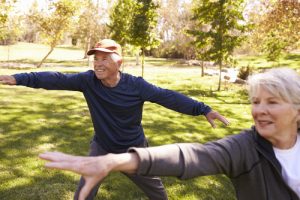
It may be the end of February and the end of American Heart Month, but it’s always time to focus on our heart health and overall fitness. Our bodies are made to move, so it’s important to continue moving as we age. Staying fit with activity and diet has many benefits beyond physically looking good, regular activity along with a healthy diet can reduce the risk of many health issues such as heart disease, stroke, dementia, some cancers, type 2 diabetes, and depression. Thinking skills, problem solving, decision making, and memory are also positively impacted with healthy habits. Being active strengthens muscles and bones to help to stay steady on your feet and reduce falls and injuries related to falls, as well as lessen aches and pains typically associated with aging. As always, consult your doctor before starting any new activity or diet.
Activity and Exercise

You don’t have to start going to the gym everyday to be fit after 60. Doing 20 to 30 minutes a day of light exercise will suffice for most people. Walking, yoga, tai chi, Qigong, or chair exercises are low impact, gentle exercises that are easy to incorporate into your day. Some fun, non-traditional activities that can be considered exercises are dancing, swimming, gardening, or fishing. It’s important that you enjoy doing the activity since you are more likely to continue to do it, if you are having fun while you’re doing it. You may even consider joining a group, or bringing a friend or your dog along to make the activity more fun and social. You are also more likely to stick with a new habit if you schedule time to do it. So, take a look at your calendar and plan a time for your exercise or activity and put it in your calendar, scheduling it for the same time everyday can help you start to create a healthy habit.
Diet
Many people are unaware that as we age, it’s not only our bodies that change but so do our nutritional needs. According to the Administration for Community Living, approximately 50% of seniors in America are malnourished. It is important to focus on eating whole foods as much as possible, food that is closest to its natural state like fresh fruits and vegetables. This helps to add more fiber into your diet, fiber reduces constipation which can help decrease the risk of diabetes, heart disease, and colon cancer; and can also lower blood cholesterol levels. Some good sources of fiber are whole grains, beans, vegetables, and fruit. If you drink orange juice, try replacing it with an actual orange to get the added benefit of the fiber with less sugar or replace white bread with whole wheat bread. Also, don’t forget to stay hydrated! Water can flush out toxins and help give you more energy. You don’t have to completely change your entire diet, but make a couple changes at a time to start creating new healthy habits that you can maintain.
Skin Care

Taking care of your skin can go a long way to help you to feel and look better. Skin loses elasticity and water as we age, so it’s important to take care of our skin no matter what our age but especially if you’re over 60. Staying hydrated inside and out is a good start, drink plenty of water and moisturize your skin daily. Exfoliate weekly to eliminate dead skin, but don’t over do it. Try to choose natural products when possible without fragrances. Apply SPF daily to eliminate sun damage. Getting adequate sleep and a healthy diet also contribute to skin health.
Balance
According to the National Council on Aging, falls are the leading cause of injuries and related deaths for seniors in America. This is a great reason to working on being fit after 60. Doing balancing exercises increase muscle mass and build strength which can help to prevent falls. Read our blog article Balance Exercises for Seniors: How to Improve Balance for Seniors for proactive things you can do to increase your balance and decrease your likelihood of falling.
Mental Fitness

Being fit goes beyond our bodies, it’s also important to keep up our mental fitness as well. Playing games like chess or bridge helps improve memory and overall cognitive function. Learning a new language, how to play an instrument, or doing crossword puzzles or Sudoku are also great ways to challenge your brain and keep it fit. It’s important to incorporate activities into your daily routine that will stimulate cognitive activity by working different parts of the brain.
Being socially active is also a great way to keep your mind fit, a study done by Bryan James from the Rush Alzheimer’s Disease Center in Chicago found that frequent social interaction can contribute to 70% less cognitive decline in people with active social lives over those who aren’t as social. Being social gives you other people to play games, do activities and to talk with. In addition to the mental benefits, being social keeps you from feeling isolation and loneliness and in turn can boost mental health.
Resources
https://www.ageuk.org.uk/information-advice/health-wellbeing/exercise/
https://familydoctor.org/healthy-habits-at-age-60-and-beyond/
https://secondwindmovement.com/6-ways-to-be-fit-over-60/
https://www.fitandwell.com/features/10-ways-to-stay-active-and-healthy-in-your-60s-70s-and-beyond
https://acl.gov/news-and-events/acl-blog/combatting-senior-malnutrition
https://www.ncoa.org/article/get-the-facts-on-falls-prevention




Thanks for sharing this one. A good read article.